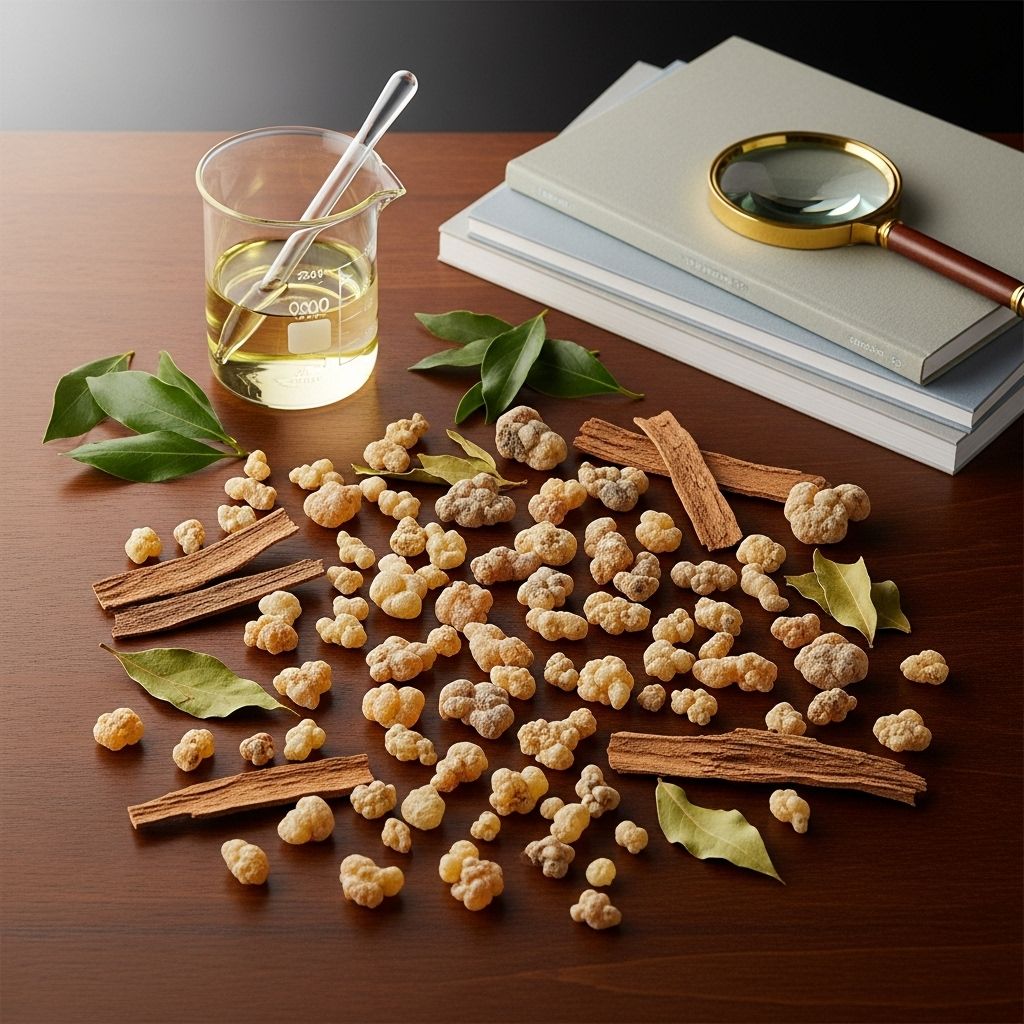Boswellia Benefits: Science-Backed Health Uses, Dosage, and Safety
Ancient resin harnessed to soothe swelling and strengthen your body's natural defenses.

What is Boswellia? Understanding the Ancient Herbal Extract
Boswellia is a herbal extract derived from the resin of the Boswellia tree—commonly known as frankincense—and is traditionally used in Ayurvedic and folk medicine spanning centuries. The resin is collected, processed, and utilized primarily for its powerful medicinal properties, notably its anti-inflammatory effects and role in supporting joint and immune health.
Key Boswellia Species
- Boswellia serrata: Most commonly studied for medicinal purposes.
- Boswellia carterii: Used in fragrance production and therapeutic applications.
- Boswellia sacra
- Boswellia frereana
Active Compounds in Boswellia
- Boswellic acids: The main bioactive molecules responsible for Boswellia’s health effects, featuring strong anti-inflammatory and antioxidant activities.
- Terpenoids: Including cembrane-type diterpenoids with remarkable biological activity.
- Triterpenoids: Ursane, oleanane, lupane and tirucallane types are identified for unique pharmacological properties.
Traditional Uses of Boswellia in Ancient Medicine
Boswellia resin has long played a role in traditional health systems as a remedy for various inflammatory conditions and chronic diseases. Its use is associated with:
- Reducing joint pain and improving mobility
- Alleviating symptoms of arthritis
- Enhancing respiratory health, such as managing asthma or bronchitis
- Supporting digestive comfort in conditions like Crohn’s disease and ulcerative colitis
- Providing menstrual pain relief
Frankincense was also regarded as sacred, used in rituals, perfumes, and as incense for its aromatic properties.
8 Research-Backed Health Benefits of Boswellia
1. Effective Natural Anti-Inflammatory
The most intensively investigated aspect of Boswellia is its anti-inflammatory action. Boswellic acids block enzymes like 5-lipoxygenase and prevent the synthesis of pro-inflammatory molecules. This multifaceted effect helps reduce swelling, pain, and tissue damage in various inflammatory diseases.
2. Improved Joint Health and Relief from Arthritis
Clinical studies reveal that Boswellia can significantly decrease joint pain and improve joint function, especially in osteoarthritis and rheumatoid arthritis. A combination of Boswellia and Curcuma longa demonstrated comparable efficacy to standard medications for knee osteoarthritis in clinical settings. This makes Boswellia a natural alternative for long-term joint support.
3. Immune System Booster
Boswellia is suggested to strengthen the immune response due to its ability to modulate inflammatory signaling pathways and antioxidant properties. Enhanced immune support is associated with increased resistance to infections and better overall health.
4. May Support Respiratory Health
Preclinical research indicates that Boswellia resin extract and its nano formulations alleviate markers of respiratory distress, reduce inflammation, and enhance lung function in animal models. Traditional practice often incorporated Boswellia to ease conditions like asthma and chronic bronchitis due to its soothing effects on the airways.
5. Antioxidant Protection
By boosting endogenous antioxidants such as glutathione, Boswellia helps lower oxidative stress, which is linked to aging and many chronic conditions. This activity contributes to the protective effect on cells, tissues, and organs against oxidative damage.
6. Potential Gut Health and Digestive Relief
Boswellia may help maintain digestive comfort and manage symptoms of inflammatory bowel diseases, including Crohn’s disease and ulcerative colitis. Its anti-inflammatory action is central to reducing gut inflammation and promoting restoration of healthy gut function.
7. Menstrual Pain Relief
Traditional remedies use Boswellia to ease menstrual discomfort and cramping due to its smooth muscle relaxing and non-hormonal pain-reducing properties.
8. Potential for Skin and Allergy Relief
Boswellia’s anti-inflammatory and anti-oxidative effect may reduce symptoms associated with eczema, psoriasis, and allergic reactions. It soothes skin irritations and supports healthier immune regulation.
Boswellia’s Phytochemistry: Insights Into Its Powerful Extracts
The therapeutic power of Boswellia is grounded in its rich phytochemical composition:
- Diterpenoids (such as boscartins and boscartols): Feature prominently in pharmaceutical research for their biological and therapeutic effects.
- Triterpenoids: Varied types with diverse activity profiles—including anti-inflammatory and antioxidant actions.
- Saponins, flavonoids, and alkaloids: Contribute to immune support and metabolic regulation.
- Carbohydrates, tannins, steroids: Play supportive roles in the extract’s health benefits.
Extraction techniques use solvents such as methanol, ethyl acetate, and chloroform to obtain the resin’s active compounds. Nano-technology approaches, including “nano sponges,” are used to enhance the delivery and sustained release of Boswellia compounds for optimized therapeutic efficacy.
How Boswellia Works: Mechanism of Action
- 5-Lipoxygenase (5-LOX) inhibition: Limits inflammatory leukotriene production, a root cause in many inflammatory disorders.
- Tumor necrosis factor-alpha (TNF-α) and Interleukin-1 beta pathway modulation: Lowers pro-inflammatory cytokines and mediators for broad-spectrum anti-inflammatory effect.
- Antioxidant enhancement: Boosts levels of reduced glutathione, helping neutralize harmful free radicals.
Clinical Studies on Boswellia’s Efficacy
| Condition | Study Type | Findings | Reference |
|---|---|---|---|
| Osteoarthritis | Human Clinical Trial | Improved pain and joint mobility, effect comparable to CELECOXIB, a standard therapy. | |
| Respiratory distress in rats | Animal Study | Reduced inflammation, improved histopathology with nano sponge formulations. | |
| Arthritis (experimental model) | Preclinical Study | Reduced inflammatory mediators and oxidative stress. |
Recommended Dosage and Forms of Boswellia Supplements
Boswellia is available in various forms including capsules, tablets, extracts, resin, and topical applications. Dosing varies depending on the standardized content of boswellic acids and the intended use:
- Standardized Extract: 300–500 mg, taken 2–3 times daily, is generally considered effective and safe.
- Active Ingredients: Seek extracts containing high levels of AKBA (acetyl-11-keto-β-boswellic acid) for maximum benefit; potent formulations may have up to 10% AKBA.
- Topical products: Used for joint pain relief, massage, or skin irritation.
Consult a healthcare provider for personalized dosage recommendations, as requirements vary by age, health status, and coexisting conditions.
Potential Side Effects and Safety Precautions
Boswellia is generally well-tolerated, but users should be aware of potential side effects and contraindications:
- Gastrointestinal symptoms: Mild nausea, diarrhea, or stomach discomfort.
- Drug interactions: Possible interactions with non-steroidal anti-inflammatory drugs (NSAIDs), anticoagulants, or immunosuppressive medications.
- Pregnancy and breastfeeding: Safety is not firmly established; consult a healthcare professional before use.
- Allergic reactions: Rare, but possible if sensitive to herbal extracts.
- Long-term use: No significant toxicity reported; research continues for higher doses or extended use.
Who Should NOT Use Boswellia?
- Individuals allergic to frankincense or tree resins
- Pregnant or breastfeeding women (unless advised by a doctor)
- Children without medical guidance
- People on prescription drugs that are metabolized by the liver/may interact with Boswellia
Always disclose supplement use to your healthcare provider before combining with other therapies or medications.
How to Choose a Quality Boswellia Supplement
- Look for standardized amounts of boswellic acids (at least 60–70% total, or 10% AKBA for maximum potency).
- Verify third-party quality testing and certifications.
- Select products in capsule or resin form from reputable manufacturers.
- Avoid products with unnecessary fillers or artificial ingredients.
Frequently Asked Questions (FAQs) About Boswellia
Q1: Can Boswellia replace prescription anti-inflammatory drugs?
No, Boswellia can complement prescribed treatments but should not replace them without a physician’s approval. It is helpful for mild to moderate joint pain and inflammation.
Q2: How long does it take to notice benefits?
Most users report noticeable improvements in joint mobility, pain, or inflammation within 2–4 weeks of consistent use.
Q3: Is Boswellia safe for long-term use?
Current research suggests it is safe for prolonged use in recommended dosages, with rare side effects.
Q4: Can Boswellia help with respiratory issues?
Studies in animal models indicate benefit in respiratory distress and inflammation, but human trials are limited.
Q5: Does Boswellia treat arthritis?
Boswellia offers symptom relief and may support joint health, but does not cure arthritis.
Q6: What should I look for in a Boswellia supplement?
High boswellic acid content, verified purity, and absence of unnecessary additives or fillers.
Community Experiences:
- User Stories: Many individuals share improvements in arthritis pain, mobility, and menstrual cramps after using Boswellia resin or supplementation.
- Empowerment and Education: Engaging with health communities can help share safe usage tips, successful dosages, and personal anecdotes on the efficacy of Boswellia extracts.
Conclusion: Harnessing Boswellia’s Therapeutic Potential
Boswellia’s extensive research profile verifies its ability to reduce inflammation, protect against oxidative stress, and support joint and respiratory health. When properly sourced and dosed, this ancient resin offers a valuable natural option for those seeking holistic support for various chronic conditions. As with all supplements, practitioners and users must apply caution, ensuring safe use alongside traditional therapies and respecting potential contraindications for the best possible health outcomes.
References
Read full bio of Sneha Tete












